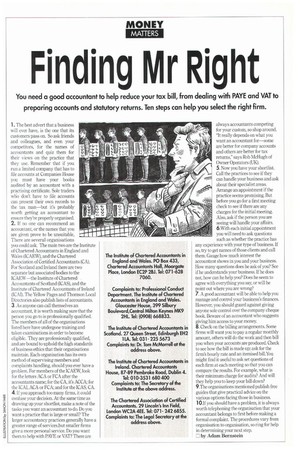Finding Mr Right
Page 35

If you've noticed an error in this article please click here to report it so we can fix it.
You need a good accountant to help reduce your tax bill, from dealing with PAYE and VAT to preparing accounts and statutory returns. Ten steps can help you select the right firm.
1 . The best advert that a business will ever have, is the one that its customers pass on. So ask friends and colleagues, and even your competitors, for the names of accountants and quiz them for their views on the practice that they use. Remember that if you run a limited company that has to file accounts at Companies House you must have your books audited by an accountant with a practising certificate. Sole traders wlio don't have to file accounts can present their own records to the tax man—but it's probably worth getting an accountant to ensure they're properly organised.
2. If no one can recommend an accountant, or the names that you are given prove to be unsuitable, There are several organisations you could ask. The main two are the Institute of Chartered Accountants in England and Wales (ICAEW), and the Chartered Association of Certified Accountants (CA). For Scotland and Ireland there are two separate but associated bodies to the ICAEW—the Institute of Chartered Accountants of Scotland (ICAS), and the Institute of Chartered Accountants of Ireland (ICAI). The Yellow Pages and Thomson Local Directories also publish lists of accountants.
3. As anyone can call themselves an accountant, it is worth making sure that the person you go to is professionally qualified. The members of all of the organisations listed here have undergone training and taken examinations in order to become eligible. They are professionally qualified, and are bound to uphold the high standards of business ethics that their organisations maintain. Each organisation has its own method of supervising members and complaints handling, should you ever have a problem. For members of the ICAEW, look for the letters ACA or FCA after the accountants name; for the CA, it's ACCA; for the IC.kl, ACA or FCA; and for the ICAS, CA.
4. If you approach too many firms, it could confuse your decision. At the same time as drawing up your shortlist, make a note of the tasks you want an accountant to do. Do you want a practice that is large or small? The larger accountancy practices generally have a greater range of services,but smaller firms give a more personal service. Do you want them to help with PAYE or VAT? There are
always accountants competing for your custom, so shop around. "ft really depends on what you want an accountant for—some are better for company accounts and others are better for tax returns," says Rob McHugh of Owner Operators (UK).
5. Now you have your shortlist. Call the practices to see if they can handle your business and ask about their specialist areas. Arrange an appointment if the practice seems promising. But before you go for a first meeting check to see if there are any charges for the initial meeting. Also, ask if the person you are seeing will handle your affairs. 6.With each initial appointment you will need to ask questions such as whether the practice has any experience with your type of business. If so, try to get names of those clients and call them. Gauge how much interest the accountant shows in you and your business. How many questions does he ask of you? See if he understands your business. If he does not, how can he help you? Does he seem to agree with everything you say, or will he point out where you are wrong?
7. A good accountant will be able to help you manage and control your business's finances. However, you should guard against giving anyone sole control over the company cheque book. Beware of an accountant who suggests giving him access to your money.
8. Check on the billing arrangements. Some firms will want you to pay a regular monthly amount, others will do the work and then bill you when your accounts are produced. Check to see how the bill is made up: ask for the firm's hourly rate and an itemised bill.You might find it useful to ask set questions of each firm at each meeting so that you can compare the results. For example, what is their minimum charge for audits? And will they help you to keep your bill down? 9.The organisations mentioned publish free guides that give practical advice on the various options facing those in business. 10.If you should have a problem, it is always worth telephoning the organisation that your accountant belongs to first before making a formal complaint. The procedures vary from organisation to organisation, so ring for help in determining your next step.
by Adam Bernstein




































































































